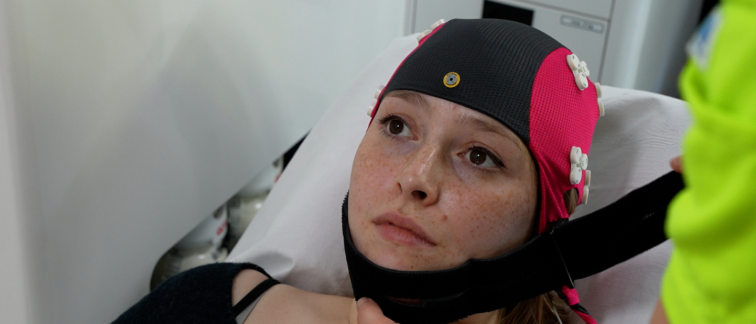Every year, millions of people worldwide are affected by a cerebral infarction. This is when a blood clot becomes stuck in the blood vessels to the brain, causing part of the brain to receive no or too little blood. Prompt treatment is crucial to prevent permanent disability or even death. Neurologist Jonathan Coutinho, clinical technologist Wouter Potters and professor of radiology Henk Marquering from Amsterdam UMC are the inventors of a smart swim cap with which an EEG (brain video) can be made in the ambulance. This brain video shows whether there is a cerebral infarction (a certain type of stroke) and whether the blocked cerebral blood vessel is large or small. This distinction determines the treatment: in the case of a small infarction the patient is given a blood thinner, in the case of a large infarction the clot must be removed in a specialized hospital. Coutinho: “With a cerebral infarction, every minute counts. The sooner we start the right treatment, the better the outcome. If the diagnosis is already clear in the ambulance, the patient can immediately be driven to the right hospital, which saves valuable time.”
The smart swim cap
The smart swim cap was tested in 12 ambulances between 2018 and 2022. Data was collected from approximately 400 patients. The study shows that the swim cap can recognize patients with a large cerebral infarction with great accuracy. Coutinho: “This study shows that the swim cap in an ambulance does its job well. This way, we can use the measurements from the swim cap to distinguish between a large or small blood vessel occlusion.”
Improve data
To develop the swim cap into a product and market it, TrianecT was founded in 2022, a spin-off company of Amsterdam UMC. In addition, a follow-up study (AI-STROKE) is currently underway that will collect even more measurements in order to ultimately develop an algorithm for even better recognition of a major cerebral infarction in the ambulance. The Hartstichting and the Hersenstichting also recognize the importance of this and have recently made 4 million euros available for large-scale research into faster treatment of a cerebral infarction. Research into diagnosing stroke in the ambulance is an important part of this subsidy.
The research was published recently in Neurology.

